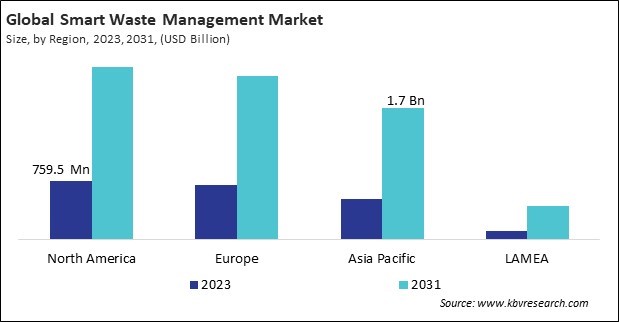According to a new report, published by KBV research, The Global Smart Waste Management Market size is expected to reach $6.5 billion by 2031, rising at a market growth of 15.3% CAGR during the forecast period. Smart waste management refers to integrating advanced technologies into traditional systems to enhance efficiency, effectiveness, and sustainability. It leverages Internet of Things (IoT) devices, data analytics, artificial intelligence (AI), machine learning (ML), and other modern technologies to optimize waste collection, transportation, processing, and disposal. The primary goals of smart waste management are to reduce operational costs, minimize environmental impact, and improve the overall management of waste.

The Residential segment is registering a CAGR of 14.8 % during the forecast period. The high volume of daily household waste, necessitating efficient management solutions, primarily drives this growth. Adopting IoT-enabled smart bins with real-time monitoring sensors has optimized waste collection schedules, reducing operational costs and environmental impact.
The Smart Collection segment led the Global Smart Waste Management Market by Method in 2023; thereby, achieving a market value of $3.4 billion by 2031. The widespread adoption of IoT-enabled sensors and advanced route optimization software drives this growth. These technologies enable real-time monitoring of waste levels and efficient waste collection scheduling, reducing operational costs and environmental impact.
The Solid Waste segment is growing at a CAGR of 14.8 % during the forecast period. Solid waste is the most commonly generated waste produced daily by households, businesses, and industries. The sheer volume of solid waste necessitates efficient management solutions to handle collection, transportation, and disposal processes.
Full Report: https://www.kbvresearch.com/smart-waste-management-market/
The North America region dominated the Global Smart Waste Management Market by Region in 2023, and would continue to be a dominant market till 2031; thereby, achieving a market value of $2.2 billion by 2031. The Europe region is anticipated to grow at a CAGR of 14.9% during (2024 - 2031). Additionally, The Asia Pacific region would witness a CAGR of 15.9% during (2024 - 2031).
By Source
By Method
By Waste Type
By Geography
 Unique Offerings
Unique Offerings